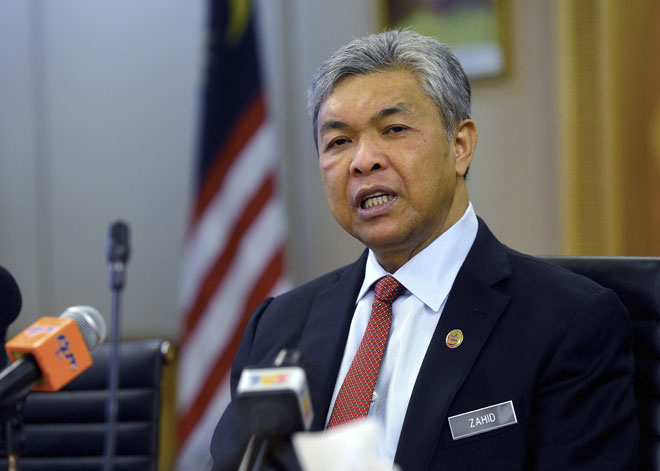
Datuk Seri Dr Ahmad Zahid Hamidi
KUCHING: The state Malaysian Trades Union Congress (MTUC) welcomes the increase in the levy for foreign workers, as announced by Deputy Prime Minister Datuk Seri Ahmad Zahid Hamidi recently.
According to MTUC Sarawak secretary Andrew Lo, the move is good for the long-term interest of industries and the country as it will compel industries to automate and modernise their operations; instead on forever relying on foreign workers.
“Deputy Home Minister Datuk Nur Jazlan Mohamed was right when he said one of the worst aspects of so many foreign workers is that they come as low-wage and low-skills (workers). Malaysian employers would then train them until they leave the country as skilled workers.
“This has squeezed Malaysian workers out of the job market,” he said in a statement issued yesterday.
Lo also said the increase in levy would mean nothing if it was not enforced properly, since there were already many illegal and undocumented foreign workers in the country.
For employers who complained that the levy rate was too high, he said the simple solution for them would be to stop hiring foreign workers.
The implementation of the new levy took effect on Feb 1, which had the levy on foreign workers in the manufacturing and construction sectors raised by two-fold, to between RM1,250 and RM2,500.
The levy on foreign workers in the services sector would also follow the new rate versus the earlier RM1,850, while the rate on foreign workers in the plantation and agriculture sectors would be RM1,500. However, the restructuring did not involve levy on foreign domestic maids, which would remain at RM410.
Ahmad Zahid Hamidi had said that the levy hike should be seen
as a positive move to reduce nation’s dependence on foreign workers.
Sarawak Timber Association (STA), however, had expressed disappointment with the government’s sudden decision, describing the change as ‘unbelievable and unreasonable’.
On another matter, MTUC Sarawak also urged Employees Provident Fund (EPF) contributors to maintain their contribution at 11 per cent.
Lo said members could fill up the EPF Form 17A — downloadable via EPF’s website — and submit it to their employers for the continuation of their 11-per cent contribution, and not eight per cent.
He explained that a lower EPF contribution would mean a lower tax relief and thus, chargeable income is higher — translating into higher income tax payable.
“Economists may laud the move in the name of spurring domestic growth and in the belief that it would increase consumer spending. They think the lower income group would most likely spend the additional cash every month.
“Most of the extra money would go to debt repayment, so the three-per cent reduction is a disparate measure and at the end of the day, (it) does not make any sense,” Lo said, adding that there was also concern about the reduction in EPF contribution could be used as an excuse by employers to not increase wages.
Prime Minister Datuk Seri Najib Tun Razak, in presenting the recalibrated Budget 2016 recently, announced the reduction in the employees’ contribution from 11 per cent to eight per cent for those aged below 60.
